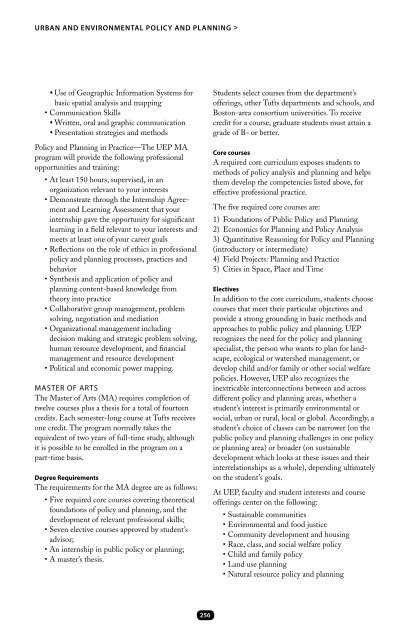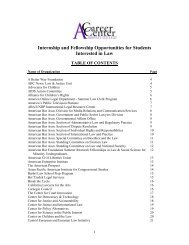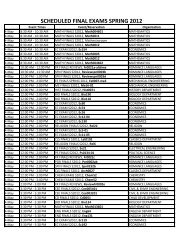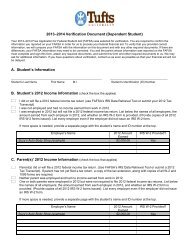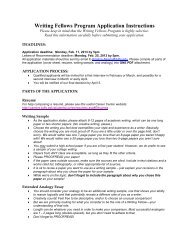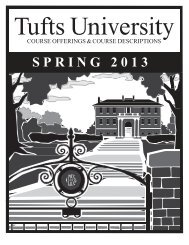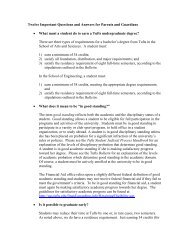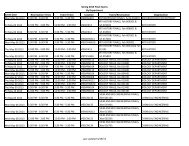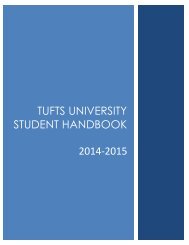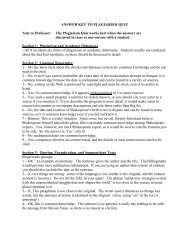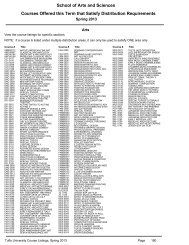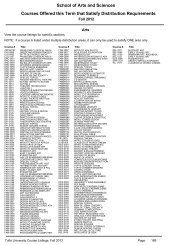2013â2014 The Bulletin - USS at Tufts - Tufts University
2013â2014 The Bulletin - USS at Tufts - Tufts University
2013â2014 The Bulletin - USS at Tufts - Tufts University
You also want an ePaper? Increase the reach of your titles
YUMPU automatically turns print PDFs into web optimized ePapers that Google loves.
Urban and Environmental Policy and Planning ><br />
Use of Geographic Inform<strong>at</strong>ion Systems for<br />
basic sp<strong>at</strong>ial analysis and mapping<br />
• Communic<strong>at</strong>ion Skills<br />
Written, oral and graphic communic<strong>at</strong>ion<br />
Present<strong>at</strong>ion str<strong>at</strong>egies and methods<br />
Policy and Planning in Practice—<strong>The</strong> UEP MA<br />
program will provide the following professional<br />
opportunities and training:<br />
• At least 150 hours, supervised, in an<br />
organiz<strong>at</strong>ion relevant to your interests<br />
• Demonstr<strong>at</strong>e through the Internship Agreement<br />
and Learning Assessment th<strong>at</strong> your<br />
internship gave the opportunity for significant<br />
learning in a field relevant to your interests and<br />
meets <strong>at</strong> least one of your career goals<br />
• Reflections on the role of ethics in professional<br />
policy and planning processes, practices and<br />
behavior<br />
• Synthesis and applic<strong>at</strong>ion of policy and<br />
planning content-based knowledge from<br />
theory into practice<br />
• Collabor<strong>at</strong>ive group management, problem<br />
solving, negoti<strong>at</strong>ion and medi<strong>at</strong>ion<br />
• Organiz<strong>at</strong>ional management including<br />
decision making and str<strong>at</strong>egic problem solving,<br />
human resource development, and financial<br />
management and resource development<br />
• Political and economic power mapping.<br />
MASTER OF ArtS<br />
<strong>The</strong> Master of Arts (MA) requires completion of<br />
twelve courses plus a thesis for a total of fourteen<br />
credits. Each semester-long course <strong>at</strong> <strong>Tufts</strong> receives<br />
one credit. <strong>The</strong> program normally takes the<br />
equivalent of two years of full-time study, although<br />
it is possible to be enrolled in the program on a<br />
part-time basis.<br />
Degree Requirements<br />
<strong>The</strong> requirements for the MA degree are as follows:<br />
• Five required core courses covering theoretical<br />
found<strong>at</strong>ions of policy and planning, and the<br />
development of relevant professional skills;<br />
• Seven elective courses approved by student’s<br />
advisor;<br />
• An internship in public policy or planning;<br />
• A master’s thesis.<br />
Students select courses from the department’s<br />
offerings, other <strong>Tufts</strong> departments and schools, and<br />
Boston-area consortium universities. To receive<br />
credit for a course, gradu<strong>at</strong>e students must <strong>at</strong>tain a<br />
grade of B- or better.<br />
Core courses<br />
A required core curriculum exposes students to<br />
methods of policy analysis and planning and helps<br />
them develop the competencies listed above, for<br />
effective professional practice.<br />
<strong>The</strong> five required core courses are:<br />
1) Found<strong>at</strong>ions of Public Policy and Planning<br />
2) Economics for Planning and Policy Analysis<br />
3) Quantit<strong>at</strong>ive Reasoning for Policy and Planning<br />
(introductory or intermedi<strong>at</strong>e)<br />
4) Field Projects: Planning and Practice<br />
5) Cities in Space, Place and Time<br />
Electives<br />
In addition to the core curriculum, students choose<br />
courses th<strong>at</strong> meet their particular objectives and<br />
provide a strong grounding in basic methods and<br />
approaches to public policy and planning. UEP<br />
recognizes the need for the policy and planning<br />
specialist, the person who wants to plan for landscape,<br />
ecological or w<strong>at</strong>ershed management, or<br />
develop child and/or family or other social welfare<br />
policies. However, UEP also recognizes the<br />
inextricable interconnections between and across<br />
different policy and planning areas, whether a<br />
student’s interest is primarily environmental or<br />
social, urban or rural, local or global. Accordingly, a<br />
student’s choice of classes can be narrower (on the<br />
public policy and planning challenges in one policy<br />
or planning area) or broader (on sustainable<br />
development which looks <strong>at</strong> these issues and their<br />
interrel<strong>at</strong>ionships as a whole), depending ultim<strong>at</strong>ely<br />
on the student’s goals.<br />
At UEP, faculty and student interests and course<br />
offerings center on the following:<br />
• Sustainable communities<br />
• Environmental and food justice<br />
• Community development and housing<br />
• Race, class, and social welfare policy<br />
• Child and family policy<br />
• Land use planning<br />
• N<strong>at</strong>ural resource policy and planning<br />
256


